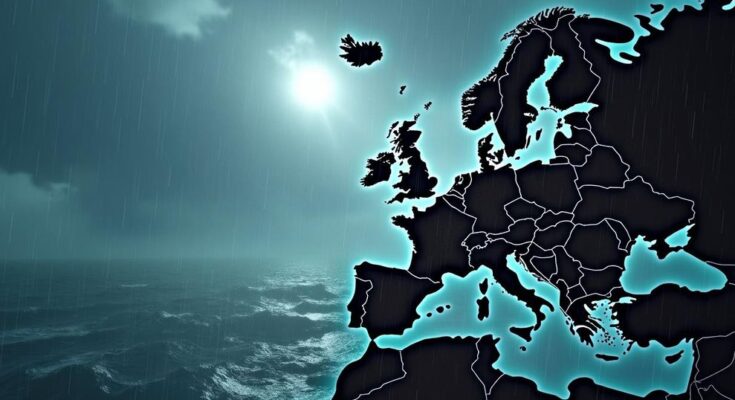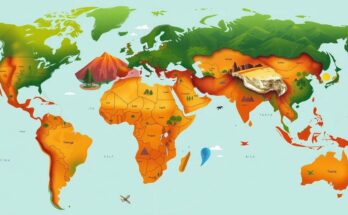Hurricane Kirk, previously a category 4 storm, is on its way to Europe and will downgrade to a category 1 hurricane. It is expected to transition into an ex-hurricane upon reaching European shores, bringing heavy rain and strong winds to northern Europe, particularly France, Belgium, and the Netherlands. Meanwhile, Hurricane Leslie has been downgraded to a category 1 hurricane and Tropical Storm Milton poses potential threats to Florida. Additionally, Brazil faces a prolonged drought and wildlife crisis following record low water levels in the Amazon River.
Hurricane Kirk is making its way toward Europe after previously reaching category 4 strength in the mid-Atlantic, with maximum winds of 145mph. As it moves northeast, it is anticipated to decrease in intensity, becoming a category 1 hurricane by Monday. In the subsequent days, Kirk is expected to undergo extratropical transition, ultimately losing its hurricane status by the time it approaches European shores on Tuesday or Wednesday. While some discrepancies remain in weather models regarding the precise trajectory of the transitioning cyclone, it is likely to cross northern Europe, affecting regions such as France, Belgium, the Netherlands, and northern Germany with intense winds and heavy rainfall. Additionally, southern parts of the United Kingdom may encounter significant rainfall if the system shifts slightly northward. Concurrent to Hurricane Kirk, the Atlantic continues to witness active hurricane formations, including Hurricane Leslie, which has recently been upgraded to a category 1 hurricane with sustained winds of 90mph. However, Leslie is also predicted to decline to tropical storm status by Tuesday morning, with no anticipated land interaction. Moreover, a tropical disturbance in the Gulf of Mexico, identified as Tropical Storm Milton, marks the 13th storm this Atlantic hurricane season. Milton is expected to rapidly develop into a major hurricane as it moves toward Florida, posing potential risks of damaging winds, heavy rains, and life-threatening storm surges, particularly along the western coast of the Florida peninsula. This prediction follows the recent devastation caused by Hurricane Helene across several states, illustrating the ongoing impact of hurricane season. Meanwhile, in South America, severe drought conditions persist, severely affecting various regions which experienced significant wildfires in Brazil recently. The Amazon River has witnessed declining water levels, reported at a 120-year low at the Port of Manus, where levels measured 12.66 meters against a historical average of 21 meters. These levels are forecasted to continue their downward trend for several weeks, contributing to the growing water crisis.
The article addresses recent developments in hurricane activity in the Atlantic, specifically Hurricane Kirk, Hurricane Leslie, and Tropical Storm Milton. It explains the trajectories, expected intensities, and potential impacts of these storms as they approach land. Additionally, it highlights a regional drought crisis affecting South America, particularly Brazil, providing a context for the environmental challenges faced in these areas. Understanding these impacts is crucial for preparedness and risk management related to severe weather events and environmental changes.
In summary, Hurricane Kirk is on track to impact northern Europe with strong winds and heavy rainfall, while Hurricane Leslie is expected to dissipate without land interaction. The emergence of Tropical Storm Milton poses new threats to Florida just weeks after Hurricane Helene’s devastating effects. Concurrently, severe drought in Brazil underlines environmental challenges exacerbated by climatic phenomena, emphasizing the need for ongoing monitoring and preparedness strategies.
Original Source: www.theguardian.com




